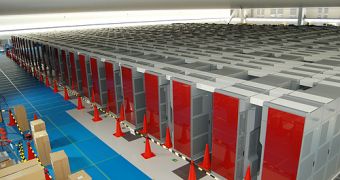Released a short while ago, the latest version of the TOP5000 supercomputer list has a new leader, a Japanese system that is powered by 68,544 Sparc-based processors from Fujitsu and that is capable of delivering a staggering 8 petaflops of computational power.
The so called K Computer is installed at the Riken Advanced Institute for Computational Science in Kobe, Japan, and dwarfs the 2.6 petaflops of the China's Tianhe-1A supercomputer which held the top spot in the previous TOP500 chart.
The Japanese K Computer is in fact so powerful that it's able to provide more computing power than the next five machines that are listed in the latest supercomputer TOP500.
Even more impressive is the fact that this system managed to achieve this feat without using any sort of GPGPU accelerators, choosing instead to rely only on specially tuned Fujitsu Sparc64 VIIIfx chips.
Each of these chips feature eight processing cores, a TDP of 58W and can deliver a peak 128 GFlops at their 2GHz clock rate.
In order to achieve this results Fujitsu has included a set of extensions developed for high performance clusters which allow applications to manage the CPUs 6MB shared L2 cache.
In addition, EETimes reports these instructions provide support for SIMD, 256 floating point registers per core and carry inter-core hardware synchronization capabilities.
But all this processing power would be useless without a fast interconnect, so scientist that built the machine came up with Tofu, which is a 6-D mesh/torus with 5 GBytes/s bandwidth that needs no external switch. Its maximum performance is rated at 10 petaflops, when linking 100,000 nodes.
Another decision that allows for the system to achieve its 8 petaflop performance is the fact that its designers installed a single CPU per node, thus delivering a simple memory hierarchy and higher memory bandwidth.
"If you want to build the fastest computer system, it needs to be balanced and well integrated--the K system is that," said Jack Dongarra, a professor at the University of Tennessee and one of the authors of the TOP500 list.
Japan hasn't held the first place in the supercomputer TOP500 since November 2004, and this also marks the first time that a Sparc-based chip powers the world's fastest computing machine.

 14 DAY TRIAL //
14 DAY TRIAL //